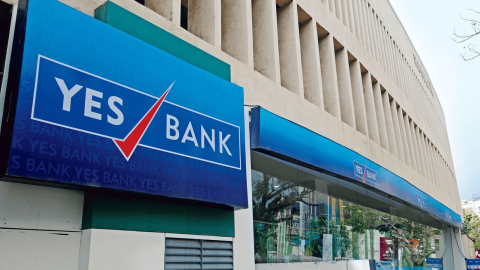Yes Bank Share Price in Focus as MUFG Aiming at Buying Stake from SBI; Stocks Trades 2% Higher
Yes Bank Share Price could see strong moves in the upcoming days as Japan's MUFG is close to buying SBI's stake in the private sector lender. Yes Bank stock has been trading in a small range over the last few quarters despite the bank showing strength in its balance sheet. The stock hasn't been able to find favor with investors and mutual funds. However, MUFG buying stake in Yes Bank could change investors' viewpoint about the private bank.
MUFG Nears Deal to Acquire Stake in Yes Bank, Valuation Pegged at Up to $7 Billion
In a potential boost for India’s banking sector, Japan’s MUFG Bank is reportedly in advanced discussions to acquire a stake in Yes Bank, according to a report published by The Hindu Businessline on April 7. The deal is expected to value the private sector lender between $6.5 billion and $7 billion, sources familiar with the matter told the publication.
MUFG, one of Japan’s largest financial institutions, is said to be negotiating directly with the State Bank of India (SBI)—the largest shareholder in Yes Bank with a 23.98% stake—as well as with other institutional stakeholders. The discussions, while still ongoing, may initially result in MUFG acquiring SBI’s stake before potentially expanding its holding to a majority position over time, the report suggested.
Strategic Entry into Indian Banking
Should the transaction go through, it would mark a significant strategic entry by MUFG into India’s private banking landscape. It also highlights rising foreign interest in Indian financial assets amid ongoing reforms and consolidation in the sector.
Yes Bank’s Financial Performance Lends Momentum
Yes Bank’s improving financials have likely bolstered investor confidence. The lender posted a net profit of Rs 612.3 crore in the third quarter of FY25, up 168% from Rs 231.6 crore during the same quarter the previous year. The surge in profit reflects improved operational efficiency and a more stable asset base.
Net interest income rose to Rs 2,223 crore, a year-on-year increase of 10.2% from Rs 1,971 crore. However, Net Interest Margins (NIMs) remained steady at 2.4%, showing little change on a quarterly or annual basis, as per the bank’s latest press release.
Stock Snapshot: Key Metrics of Yes Bank
With the stock hovering near its 52-week low, technical indicators signal a potential base formation. Backed by a moderate price-to-earnings ratio and improving market confidence, this analysis delves into Yes Bank's price action, chart behavior, and strategic positioning in India's competitive banking space. From Fibonacci retracement to recent support and resistance levels, here’s what investors need to know to assess the next move in Yes Bank’s journey. The table below provides a concise overview of Yes Bank’s key market statistics:
| Stock | Open (Rs) | High (Rs) | Low (Rs) | 52-wk High (Rs) | 52-wk Low (Rs) | Market Cap (Cr) | P/E Ratio | Dividend Yield (%) |
|---|---|---|---|---|---|---|---|---|
| Yes Bank | 17.05 | 17.29 | 16.90 | 28.55 | 16.02 | 53,930 | 24.38 | - |
Current price action indicates that Yes Bank is consolidating at the lower end of its 52-week range, with buying interest seen near Rs 16.
Candlestick Pattern Analysis
On the daily chart, Yes Bank recently formed a Doji pattern near its 52-week low, suggesting indecision among buyers and sellers. This often precedes a reversal or trend continuation, depending on volume confirmation.
The candle following the Doji was a small bullish body, hinting at an early sign of demand near the Rs 16–17 zone. If sustained, this could set up a short-term base.
Fibonacci Retracement Levels
Using the recent high of Rs 28.55 and the low of Rs 16.02 as reference points, the Fibonacci retracement levels are:
| Level | Price (Rs) |
|---|---|
| 23.6% | 18.95 |
| 38.2% | 20.94 |
| 50% | 22.29 |
| 61.8% | 23.64 |
| 78.6% | 25.52 |
Key observation: The Rs 20.90–22.30 zone will be critical resistance should the stock bounce from current levels. A break above 23.60 could signal a medium-term reversal.
Support and Resistance Levels
Immediate Support: Rs 16.00 (recent low)
Secondary Support: Rs 15.10 (psychological and historical demand zone)
Resistance 1: Rs 18.95 (23.6% Fibonacci level)
Resistance 2: Rs 22.30 (50% retracement)
If Yes Bank sustains above Rs 17.50 with strong volume, it may test Rs 20–22 levels in the short term.
Actionable Strategy for Investors
Short-term traders could consider accumulating around Rs 16.50–17 with a stop loss below Rs 15.80 and targets near Rs 20.
Long-term investors should wait for a breakout above Rs 22.50, confirming trend reversal backed by volume and improving financial metrics.
While the fundamentals remain in a rebuilding phase, Yes Bank’s low valuation and growing retail franchise may support gradual upside, provided macro and regulatory conditions remain favorable.
Outlook and Implications
While the deal is yet to be finalized, MUFG’s prospective investment could signal growing global confidence in the recovery and growth trajectory of Indian banks. If completed, the acquisition would not only reinforce Yes Bank’s capital position but also provide it with global expertise and strategic direction through one of Asia’s most prominent banking groups.
